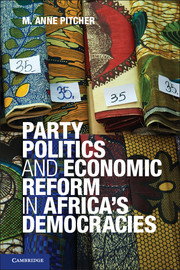Book contents
- Frontmatter
- Contents
- Tables, Figures, and Maps
- Acknowledgments
- Abbreviations
- Map
- 1 Understanding Institutional Development in Africa
- 2 From Motivational to Imperative Commitment
- 3 The Impact of Party Politics and Democratic Quality on Economic Reform
- 4 Party Fragmentation and Ad Hoc Private Sector Development in a Limited Democracy
- 5 Stable Parties, Limited Democracy, and Partisan Private Sector Development
- 6 Stable Parties, Liberal Democracy, and Strategic Compromise
- 7 Conclusion
- Appendix 1 Coding Scheme
- Appendix 2 Coding Scheme Indicators of Imperative Commitments
- Appendix 3 Effective Number of Parliamentary Parties (ENPP) in Nine African Democracies c. 1990s–2000s
- Bibliography
- Index
- References
6 - Stable Parties, Liberal Democracy, and Strategic Compromise
South Africa
Published online by Cambridge University Press: 05 June 2012
- Frontmatter
- Contents
- Tables, Figures, and Maps
- Acknowledgments
- Abbreviations
- Map
- 1 Understanding Institutional Development in Africa
- 2 From Motivational to Imperative Commitment
- 3 The Impact of Party Politics and Democratic Quality on Economic Reform
- 4 Party Fragmentation and Ad Hoc Private Sector Development in a Limited Democracy
- 5 Stable Parties, Limited Democracy, and Partisan Private Sector Development
- 6 Stable Parties, Liberal Democracy, and Strategic Compromise
- 7 Conclusion
- Appendix 1 Coding Scheme
- Appendix 2 Coding Scheme Indicators of Imperative Commitments
- Appendix 3 Effective Number of Parliamentary Parties (ENPP) in Nine African Democracies c. 1990s–2000s
- Bibliography
- Index
- References
Summary
The South African economy differs markedly from those of Zambia and Mozambique in many respects. Its GDP of US$283 billion in 2007 dwarfed most other economies in Sub-Saharan Africa. Per capita income for this nation of 48 million people averaged US$4,770 in 2007, while those of Mozambique and Zambia were US$310 and US$700 per capita, respectively. South Africa dominated regional trade among the group of countries that are members of the Southern African Development Community. In addition, South African investment in Mozambique and Zambia consistently ranks among the top with regard to the number and value of investments. Its influence on the other two cases is therefore considerable.
Unlike the other two countries, the private sector dominated South Africa’s economy at the time of the transition to parliamentary democracy. Whereas the state sector in South Africa was important, its contribution to the GDP was only 14 percent. Moreover, the government’s decision to commit to structural adjustment cannot be traced to a severe crisis in the parastatal sector, as was the case with the other countries. Although global trends and interests influenced the economic policy choices of South Africa’s new democratic government after 1994, the adoption of a neo-liberal agenda did not derive from donor dependence, nor was it linked to the pressures of conditionality.
- Type
- Chapter
- Information
- Party Politics and Economic Reform in Africa's Democracies , pp. 187 - 235Publisher: Cambridge University PressPrint publication year: 2012

